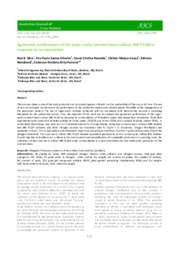Agronomic performance of the super-early common bean cultivar BRS FC104 in response to co-inoculation.
Agronomic performance of the super-early common bean cultivar BRS FC104 in response to co-inoculation.
Autoria: SILVA, N. B.; OLIVEIRA, A. P. S.; REZENDE, C. C.; SOUSA, C. M.; WENDLAND, A.; FERREIRA, E. P. de B.
Resumo: The common bean is one of the most produced and consumed species in Brazil, but the productivity of the crop is still low. The use of new technologies has increased the performance of the production system and allowed greater flexibility in the management of the production system. The use of super-early cultivars combined with co-inoculation with bacteria has become a promising alternative for the production system. Thus, the objective of this work was to evaluate the agronomic performance of the super-early common bean cultivar BRS FC104 in response to co-inoculation of Rhizobium tropici and Azospirillum brasiliense. Three field experiments were conducted in Santo Antônio de Goiás (water 2018/19 and winter 2019) and in Abadia de Goiás (winter 2019). A randomized block design was used in a 2 x 3 factorial scheme for all experiments, being two common bean cultivars (BRS Notável and BRS FC104 cultivars) and three nitrogen sources (co-inoculation with R. tropici + A. brasilense; nitrogen fertilization and untreated control). The co-inoculation with Rhizobium tropici and Azospirillum brasilense resulted in grain yield equal to that of the nitrogen treatment. The super-early cultivar BRS FC104 showed equivalent productivity as the normal cycle cultivar BRS Notável. Considering that N-fertilizers are a threat to the environment and intensification of sustainable production is a pressing need, the cultivation of the super-early cultivar BRS FC104 under co-inoculation is a recommendation for the sustainable production of the common bean.
Ano de publicação: 2023
Tipo de publicação: Artigo de periódico
Unidade: Embrapa Arroz e Feijão
Palavras-chave: Beans, Bioagent, Environmental sustainability, Feijão, Phaseolus Vulgaris, Produtividade, Simbiose, Symbiosis
Observações
1 - Por padrão são exibidas publicações dos últimos 20 anos. Para encontrar publicações mais antigas, configure o filtro ano de publicação, colocando o ano a partir do qual você deseja encontrar publicações. O filtro está na coluna da esquerda na busca acima.
2 - Para ler algumas publicações da Embrapa (apenas as que estão em formato ePub), é necessário ter, no celular ou computador, um desses softwares gratuitos. Sistemas Android: Google Play Livros; IOS: iBooks; Windows e Linux: software Calibre.
Acesse outras publicações
Acesse a Base de Dados da Pesquisa Agropecuária (BDPA) para consultar o acervo completo das bibliotecas da Embrapa.

